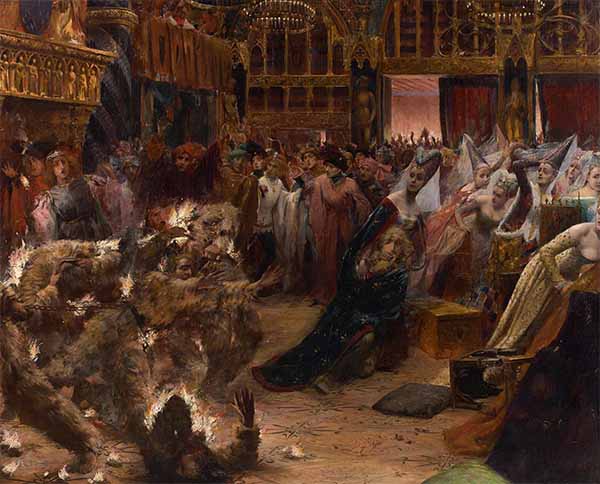Tragedy of the Bal des Ardents

Charles VI engaged in a fatal and condemnable masquerade, but divine anger is not enough to explain the tragedy that has unfolded. Did anyone around him have an interest in the king's disappearance?
It was originally just a party like many organized to entertain the court in the Hôtel Saint-Pol, home of King Charles VI in Paris. On this evening of Tuesday January 28, 1393, Queen Isabeau of Bavaria celebrates the third wedding of her favorite maid of honor, Catherine. A masked ball is organized, to which six merry men want to bring a little spice by having the absurd idea of disguising themselves as furry savages, dressed in linen coats coated with pitch and covered with hair from head to toe to dance a "sarrazine” frenzied, chained to each other and howling like wolves.
A sacrilegious hullabaloo
To be on the safe side, the king ordered that torches that could easily ignite pitch-coated costumes be kept away. In the twilight, the audience, as much amused as they were intrigued, never ceased to discover who was behind these disguises, when the Duke of Orleans, the king's brother, arrived. The latter immediately recklessly approaches a torch from one of the dancers, which immediately ignites, in turn igniting his companions, including Charles VI. Four of the dancers, transformed into human torches, perish burned alive while the Lord of Nantouillet has the presence of spirit to throw himself into a tub of dishwater. Charles VI is saved by the Duchess of Berry who wraps him in the thick fabric of her dress. A princely feast has turned into a drama with a clumsy gesture.
Everywhere in Paris the news spreads, anger is already roaring, because popular emotion is ambiguous. Certainly we feared for the king's life, but we are equally apprehensive to learn that the tragedy is nothing less than the expression of divine anger fallen to chastise in mortal sin. It is because the king and his companions have indeed committed a real sacrilege by following a popular custom strictly prohibited by the Church! Rather than a masquerade, they lent themselves to a hullabaloo, that is, a mocking uproar that leads men dressed as wild beasts to ridicule a marriage deemed to be ill-suited. The Bal des Ardents scandalizes the Church and terrorizes public opinion which fears a new divine punishment: famine, war or pestilence. Who had the monstrous idea to organize this hullabaloo? We soon learn that it is Louis of Orleans.
Charles the Beloved, and Louis the hated ...
As much the people love their sovereign, they hate their brother Louis, Duke of Orléans, to whom we attribute all the vices. Elegant and refined, a man of culture who loves the arts, he is also that notorious debauchery with an insatiable sexual appetite. The beautiful Valentina Visconti his wife is obviously not enough for him, he must constantly satisfy imperious desires during parties in which he abandons himself without restraint to his perversions, "making rigor, cruelty and villainy towards ladies and young gals". Worse still than this turpitude, there is his immoderate taste for gambling in which he invests considerable sums, this game which the Church condemns. His sulphurous reputation naturally swells, for in the popular imagination the nights of debauchery of a powerful prince quickly become satanic celebrations, and it is accepted that the Duke of Orleans is a wizard. We have seen him take an interest in the occult sciences, we speak of devilish invocations during macabre rites ...
The plot of an evil couple?
The only brother of a sovereign already weakened by the disease that has instilled in him since his first fit of madness in the forest of Le Mans six months previously, would Louis of Orléans have tried to hasten the end of the king to sit on the throne of France? For it was he who held the torch that set the revelers ablaze. When subsequently the king will be again taken of madness without one being able to understand the strange and pernicious evil which embraces him, the eyes will turn to his wife, the too beautiful Valentina Visconti: the king was poisoned, even bewitched! There is no shortage of strange and opportune illnesses in these Visconti who are said to be familiar with the secrets of poisons. The Milan master’s daughter shouldn't ignore them either… and that’s why she was kicked out of court.
To ward off the curse
Despite his madness, Charles VI will remain for his subjects the “Beloved” who removed from power, in 1388, his uncles the Dukes of Anjou, Burgundy, Berry and Bourbon, whose fiscal policy had aroused in Paris the revolt of the Maillotins, and the uprising of the towns of Flanders. With the former advisers of his father Charles V, he restored concord in the kingdom. After the tragedy of the Bal des Ardents, we are witnessing processions and expiatory ceremonies all over the place in the hope of warding off the curse that fell on the king and therefore on France.
The princes themselves must go in procession, barefoot, to Notre-Dame. Prostitution and gambling are prohibited, and among the main accused of angering God against France, the Jews were expelled from the kingdom.









































































































































































































































































































































